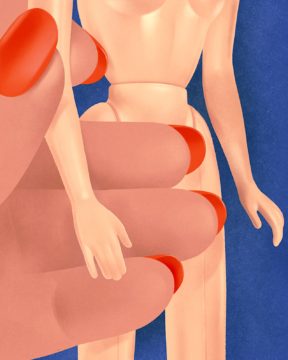Leslie Jamison in The New Yorker:
 My childhood Barbies were always in trouble. I was constantly giving them diagnoses of rare diseases, performing risky surgeries to cure them, or else kidnapping them—jamming them into the deepest reaches of my closet, without plastic food or plastic water, so they could be saved again, returned to their plastic doll-cakes and their slightly-too-small wooden home. (My mother had drawn her lines in the sand; we had no Dreamhouse.) My abusive behavior was nothing special. Most girls I know liked to mess their Barbies up; and when it comes to child’s play, crisis is hardly unusual. It’s a way to make sense of the thrills and terrors of autonomy, the problem of other people’s desires, the brute force of parental disapproval. But there was something about Barbie that especially demanded crisis: her perfection. That’s why Barbie needed to have a special kind of surgery; why she was dying; why she was in danger. She was too flawless, something had to be wrong. I treated Barbie the way a mother with Munchausen syndrome by proxy might treat her child: I wanted to heal her, but I also needed her sick. I wanted to become Barbie, and I wanted to destroy her. I wanted her perfection, but I also wanted to punish her for being more perfect than I’d ever be.
My childhood Barbies were always in trouble. I was constantly giving them diagnoses of rare diseases, performing risky surgeries to cure them, or else kidnapping them—jamming them into the deepest reaches of my closet, without plastic food or plastic water, so they could be saved again, returned to their plastic doll-cakes and their slightly-too-small wooden home. (My mother had drawn her lines in the sand; we had no Dreamhouse.) My abusive behavior was nothing special. Most girls I know liked to mess their Barbies up; and when it comes to child’s play, crisis is hardly unusual. It’s a way to make sense of the thrills and terrors of autonomy, the problem of other people’s desires, the brute force of parental disapproval. But there was something about Barbie that especially demanded crisis: her perfection. That’s why Barbie needed to have a special kind of surgery; why she was dying; why she was in danger. She was too flawless, something had to be wrong. I treated Barbie the way a mother with Munchausen syndrome by proxy might treat her child: I wanted to heal her, but I also needed her sick. I wanted to become Barbie, and I wanted to destroy her. I wanted her perfection, but I also wanted to punish her for being more perfect than I’d ever be.
It’s not that I literally wanted to become her, of course—to wake up with a pair of hard plastic tits, coarse blond hair, waxy holes in my feet betraying the robotic fingerprint of my factory birthplace—but some part of me was already chasing the false gods she spoke for: beauty as a kind of spiritual guarantor, writing blank checks for my destiny; the self-effacing ease afforded by wealth and whiteness; selfhood as triumphant brand consistency, the erasure of opacity and self-destructive tendency. I craved all of these—still do, sometimes—even as my own awareness of their impossibility makes me want to destroy their false prophet: Barbie as snake-oil saleswoman hawking the existential and plasticine wares of her impossible femininity, one Pepto-Bismol-pink pet shop at a time.
More here.
